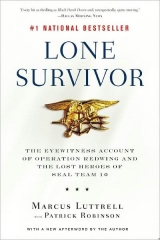
Текст книги "Lone survivor"
Автор книги: Marcus Luttrell
Жанры:
Военная история
,сообщить о нарушении
Текущая страница: 19 (всего у книги 24 страниц)
I switched that sucker off, real quick. And one of my guys, walking out in front with his AK, had some English. He came back to me and whispered: “Taliban see light, they shoot you, Dr. Marcus.”
Finally we reached high ground, and I picked up the word helicopter. And right here I thought someone might be coming to rescue me. But it was just a false alarm. Nothing came. I stretched out on the concrete, and some time before dawn, Sarawa showed up with his medical bag and attended to my leg. He removed the blood-soaked dressings, washed out the wounds, and applied antiseptic cream and fresh bandages. Then, to my astonishment, he produced some insulin for the diabetes I didn’t have.
Guess I was a better liar than I thought. And I obviously had to take it. The stuff I do for my country. Unbelievable, right?
They moved me into a house up there near the top of the village, and soon after I arrived I met my first real friend, Mohammad Gulab, the thirty-three-year-old son of the village elder, and the resident police chief. Everyone called him Gulab (pronounced Goo-larb), and his position in the community was very strong. He made it clear the Taliban were not going to take me while he had anything to do with it.
He was an extremely nice guy, and we became good friends, or as close to good friends as it’s possible to be when the language barrier is almost insurmountable. Mostly we tried to communicate about families, and I understood he had a wife and six children and God knows how many cousins and uncles. Conveying news about my identical twin brother was a tough one, so we just settled for brother, mainly because Gulab unfailingly thought Morgan was me. Like a lot of other folk have done down the years.
Gulab had a friend with him who was also a solid man, plainly an appointed relief guard. Between them they never left me alone. By this time I knew why. The village was entirely embarrassed when the Taliban had crept in here armed to the teeth and conducted an interrogation regardless of the wishes of the people. Those warriors had been on the verge of causing the ultimate retribution under the laws of lokhay, which would have obliged the village to go to war to the last man on my behalf.
I did not yet comprehend the full implications of lokhay but I knew it was important and that I would not be surrendered. And now I had a full-time guard detail in my room. This did not prevent other visitors from coming in, and my first on that morning in my new house was a little boy, maybe eight or nine years old.
He sat on the edge of my cot and tried to teach me a Muslim prayer: La La e La La – Muhammad del la su La La. I pretty soon got the hang of it and repeated it with him. He was thrilled, clapped his hands and laughed, and charged out through the door to round up a posse of other kids. Gulab tried to inform me that the repetition of that prayer meant that I was now a Muslim. And almost immediately the first little boy came racing back into the room with all his buddies, about twenty of them, all eager to pray with the new Texan convert.
I tried to explain I was a doctor, and they understood this pretty quickly, started saying over and over, “Hello, Dr. Marcus,” laughing like hell and falling about like kids do. I could tell they really liked me, and I borrowed a marker pen one of them had and wrote each of their names in English on their arms. Then I let them write their names on mine.
We exchanged words for ears, nose, and mouth. Then for water (uba) and for walk (ducari), both of which I found useful. In the end they left, but other local tribesmen came in to speak to Gulab, and I began, with his encouragement, to converse with the guys who walked the goats, the men who would understand distance. Slowly, during the course of the day, we established there was a small American base two miles away.
They pointed out the window directly at a mountain which looked like a spare part from the Rockies. It towered above us, a great wall of granite that would have caused a mountain goat to back off. “Over there, Dr. Marcus, far side,” one of them managed to say. And since I probably could not have reached the window, never mind the mountain, I put that plan on the back burner for the moment.
They had been referring to the village of Monagee, in the district of Manrogai, where I knew the U.S. military had some kind of an outpost. But it was out of the question right now. I couldn’t get there or anywhere else until my leg improved. Nonetheless, the goatherds had some good information about the terrain and the distances to various villages and U.S. bases. These guys walk around the mountains for a living. Local knowledge. That’s key to every serving SEAL, especially one who was planning a kind of soft jailbreak, like me.
With the goatherds, I was able to work out that from the scene of the original battlefield where the others died, on that terrible night of June 28 I had traveled around seven miles, four walking, three crawling. Seven miles! Wow! I couldn’t believe that. But these herders knew their land. And they, like everyone else, knew all about the Battle for Murphy’s Ridge, where it had been fought and the very bad losses sustained by the Taliban...“You shoot, Dr. Marcus? You shoot?”
Me? Shoot? Never. I’m just a wandering doctor trying to look after my patients. But I was real proud of traveling seven miles over the mountain in my beat-up condition after the battle.
I took my ballpoint pen and marked distances, drew maps, made diagrams of the mountains on my right thigh. When that got a little crowded, I had to use my left. (Shit! That hurt. That really hurt!)
At noon the kids came back for prayers, bringing with them several adults, clearly eager to meet the new American convert, no longer an infidel. We prayed together to Allah, kneeling – painfully, in my case – on the floor. After which we all shook hands, and I think they welcomed me to their prayers. Never told ’em, of course, I slipped in a quick one to my own God while I was at it, respectfully wondering, if it was all right with Him, whether I could get my rifle back anytime soon.
They all came back for afternoon prayers at 1700, and again at sunset. The little kids, my first friends, had to leave for bed right after that, but I remember they all came and hugged me before they left, and, not having mastered “Good-bye” or “Good night” yet, they repeated their first American phrase again and again as they left the room: “Hello, Dr. Marcus.”
The older kids, the young teenagers, were allowed to stay and talk with me for a while. Gulab helped them to communicate and we parted as friends. The trouble was, I was getting sick now, and I was beginning to feel pretty ropy, not just the pain of my wounds but kind of like flu, only a bit worse.
When the kids had finally left, I received a visit from the village elder himself. He brought me bread, gave me fresh water, then sat down for maybe three hours while we discussed, as best we could, how I could get to an American base. It was clear I was a major problem to the village. Threats were already being received from the Taliban, informing the villagers how urgent it was for their cause that I be surrendered to them immediately.
The old man imparted this to me but took the view I was in no shape to travel and that it would simplify matters for a member of his Pashtun tribe to make the journey, on foot, to the big U.S. base at Asadabad and inform them of my whereabouts. I had no clue at the time he was preparing to make the journey himself, some thirty to forty miles alone in the mountains.
He asked me to write out a letter for him to take to Asadabad. I wrote, This man gave me shelter and food, and must be helped at all costs. At the time I was under the distinct impression that he and I were going to make the journey together, possibly with an escort and a few guys to help carry me. Departure time was set for 1930, right after evening prayers.
But I had misunderstood. The old man had no intention of traveling with me, correctly reasoning I’d be a far greater nuisance on such a trek over the mountains than I would be lying here. Also, if the Taliban found out we’d gone, we would be highly susceptible to ambush. I never saw him again, to thank him for his kindness.
I waited all afternoon and half the night for him to come and have me collected. But of course he never did. I remember being hugely disappointed, not for the first time, that more definite plans were not being formulated for my evacuation.
At one point during the evening, the tribal leaders came and had a meeting in my room. They just sat on the floor and talked, but they brought me back the little silver cup I’d had in the first house. And they poured me several cups of that chai tea they drink and, I think, grow on a small scale up here. The ceremony included sweet candy, which you eat while you drink your tea. And that tasted great after my enforced diet of very, very dry baked flat bread.
Gulab stayed with me and was cheerful as ever, but he either could not or would not answer questions about his father and his immediate plans. I think the tribal leaders felt it was better for me not to know – classified, Pashtun-style, FYO and all that. The work of the elder was information provided on a need-to-know basis only. I was getting used to operating outside the loop, everyone’s freakin’ loop, that is.
Gulab spent much of the evening trying to explain to me the complex threads that hold together the Pashtun tribes and al Qaeda, still working in conjunction with the Taliban army. The United States had been busy trying to clear all of them the hell out of Afghanistan for four years but with only limited success.
The jihadists seem to have some kind of hammerlock on tribal loyalties, using a whole spectrum of Mafia-style tactics, sometimes with gifts, sometimes with money, sometimes promising protection, sometimes with outright threats. The truth is, however, neither al Qaeda nor the Taliban could function without the cooperation of the Pashtun villages.
And often, deep within the communities, there are old family ties and young men who sympathize with the warlike mentality of the Taliban and al Qaeda chiefs. Kids barely out of grade school – joke, they don’t have grade schools up here – are drawn toward the romantic cutthroats who have declared they’ll fight the American army until there is no one left.
I guess there’s something very alluring about that to some kids. You can see these potential Taliban recruits in any of the villages. I’ve seen dozens of them, too young to have that much hate and murder in their eyes and hearts. Christ, one of the little bastards had sat on my bed urging eight armed men to torture me. Nice. He couldn’t have been more than seventeen.
But there is another side to this. Sabray was obviously governed wisely by Gulab’s father. And there was a sense of law and order and discipline in an essentially lawless land. Al Qaeda effectively owns great swaths of land in Kunar Province, which had now been my home for the better part of three months. And this is mostly because of the terrain.
I mean, how the hell do you impose national government on a place like this? With no roads, no electricity, no mail, little communication, where the principal industry is goats’ milk and opium, the main water company is a mountain stream, and all freight is moved by mule cart, including the opium. You’re whistling Dixie. It’s never going to happen.
Al Qaeda are running around in broad daylight, mostly doing what the heck they want, until we show up and chase the little pricks back over the border to Pakistan. Where they stay. For about ten minutes, before launching their next foray into these tribal mountains, which their ancestors have ruled for centuries.
These days there are less gifts and a lot more fear. The Taliban is a ruthless outfit, with instincts about killing their enemies which have barely changed in two thousand years. They should somehow by now have frightened the bejesus out of my buddy Gulab and his father, but they had not succeeded, so far as I could see. There’s just something unbreakable about them all, a grim determination to follow the ancient laws of the Pashtuns – laws which may yet prove too strong even for the Taliban and al Qaeda.
But from where I was sitting, in the smoky main room of one of Sabray’s high houses, talking to the village cop, that’s not the way the tide was running. And until the United States decides to wield a very large stick up here in support of the elected government of the people, in Kabul, I’m not looking for any serious change real soon. The enemy is prepared to go to any lengths to achieve victory, terrorizing its own people, if necessary, and resorting to barbaric practices against its enemy, including decapitating people or butchering them.
We are not allowed to fight them on those terms. And neither would we wish to. However, we could fight in a much more ruthless manner, stop worrying if everyone still loved us. If we did that, we’d probably win in both Afghanistan and Iraq in about a week.
But we’re not allowed to do that. And I guess we’d better start getting used to the consequences and permit the American liberals to squeak and squeal us to ultimate defeat. I believe that’s what it’s called when you pack up and go home, when a war fought under your own “civilized” terms is unwinnable.
We’re tougher, better trained, better organized, better armed, with access to weapons which cannot be resisted. The U.S. Armed Forces represent the greatest fighting force this world has ever seen, and we keep getting our butts kicked by a bunch of illegal thugs who ought to be eliminated.
Look at me, right now in my story. Helpless, tortured, shot, blown up, my best buddies all dead, and all because we were afraid of the liberals back home, afraid to do what was necessary to save our own lives. Afraid of American civilian lawyers. I have only one piece of advice for what it’s worth: if you don’t want to get into a war where things go wrong, where the wrong people sometimes get killed, where innocent people sometimes have to die, then stay the hell out of it in the first place.
Because that’s what happens. In all wars, down all the years of history. Terrible injustices, the killing of people who did not deserve to die. That’s what war is. And if you can’t cope with it, don’t do it.
Meantime, I was stuck in the house waiting for the old man to show up, when he was already miles away, walking through the mountains, the thirty or so miles to Asadabad. Once I wandered outside when no one was looking, and I tried to find him. But he seemed to have gone missing. Even then I never dreamed that little old guy was walking to Asadabad by himself.
I couldn’t really tell, but I sensed something was making my guys jumpy. And about ten or eleven o’clock that night, we moved. They had just brought me fresh water and bread, which I consumed gratefully, and then I was instructed to pack up and leave. By this time my leg was a little better, even though it hurt, and with some assistance I was able to walk.
We made our way in the dark down to a different house and stepped off the trail directly onto the roof. We had some kind of a sheet, and the three of us laid down close together for warmth. It was very, very cold, but I guess they felt there was some danger if I’d remained in my old spot. Maybe they had suspicion of someone in the village, worry that someone had tipped off the Taliban as to my precise whereabouts. But whatever, these guys were taking no chances. If Taliban gunmen burst into my old house, they would not find me.
I was up here on the freakin’ roof, huddled with Gulab and his buddy, freezing to death but safe. And once more I was amazed by the silence, that mountain silence. There was not one single sound in the entire village of Sabray, and for a Westerner that’s really hard to imagine.
Gulab and his pal made no sound. I could scarcely hear them breathing. Whenever we did anything, they were always telling me shhhhh, when I had thought I was being silent as the grave. It’s another world up here, so quiet it defies the logic of Western ears. Maybe that’s why no one has ever conquered these high lands of the Afghan tribesmen.
I slept on and off through the night, up there on the roof. Once I dared to change position, and you’d have thought I’d set off a fire alarm from the reaction of my new friends. “Shhhhh, Dr. Marcus...Quiet.” It just showed how jumpy they were, how nervous of the hushed killers of the Taliban army.
At dawn we packed up and returned to the house. I wanted to sleep some more, but there was a big tree right outside the window that had a view down the mountain, and in that tree lived the world’s loudest rooster. That sucker could have awakened a graveyard. And he did not give a damn about dawn, first light and all that. He let it fly right after midnight and never let up. There were several times when, if it had come to a straight coin toss between taking out Sharmak or the rooster, I could easily have spared Sharmak.
The tribal chiefs came back again around 0700 to conduct their early morning prayers in my room. Of course I joined them in reciting the bits I had learned, and then, when the adults left, the door flew open and a whole bunch of kids came charging through the door, shouting, “Hello, Dr. Marcus.”
They never knocked, just came tumbling in, grabbing me and hugging me. And it went on intermittently throughout the day. Sarawa had left his medical bag in my room, and I fixed up their cuts and scrapes, and they taught me bits of their language. Those kids were great. I’ll never forget them.
By that Saturday morning, July 2, I was still in a lot of pain; my shoulder, back, and leg were often killing me. Gulab knew this, and he sent an old man from the village to see me. He came with a plastic pouch containing tobacco opium, which looks like green bread dough. He gave me the pouch, and I took a pinch of the stuff, put it in my lip, and waited.
I’m here to tell you, that was a miracle. The pain slowly vanished, completely. It was the first time I’d ever done drugs, and I loved it! That opium restored me, set me free. I felt better than I had since we all fell down the mountain. What with the Muslim prayers and now my becoming a devotee of the local dope, I was drifting into the life of an Afghan peasant. Hooyah, Gulab, right?
The old man left the bag with me, and it helped me get through the next hours more than I can say. When you’ve lived through a lot of pain for a few days, the relief is terrific. For the first time I understood the power of that drug, which is, of course, the one the Taliban and al Qaeda feed to suicide bombers before they obliterate themselves and everyone else within range.
There’s nothing heroic about suicide bombers. They’re mostly just dumb, brainwashed kids, stoned out of their minds.
Outside the house, I could see the U.S. helicopters flying overhead, Black Hawk 60s and MH-47s, obviously looking for something. Hopefully me. I knew from what the Taliban had said that one of our helos was down, but not, of course, who had been on board, that eight more of my buddies from Alfa Platoon were dead, including Shane Patton, James Suh, and Chief Healy.
I also did not know that neither Mikey’s, Danny’s, nor Axe’s body had been found and that the helos were circling the area trying to pick up any trace of the original four who had set off on the ill-fated Operation Redwing. The aircrew did not know whether any of us were alive or dead. And back home, the media were vacillating between dead and missing, whichever made the best story on the day, I guess. Didn’t help any in East Texas, I can say that.
Anyway, when I saw those helos, I charged outside. I took off my shirt and waved it over my head, yelling, “Here I am, guys! I’m right here. It’s me, Marcus! Right here, guys!”
But they just flew off, leaving me a somewhat forlorn figure standing outside the house, trying to put on my shirt, and wondering again whether anyone would ever come and rescue me.
In the fullness of time I understood the quandary for the American military. Four SEALs, fighting for their lives, had made one final communication that we were dying up here. Since then, there had been neither sight nor sound of the four of us.
Militarily, there were several possibilities, the first being we were all now dead. The second was we were all still alive. The third was there were survivors, or at least a survivor, and they were somewhere on the loose, possibly wounded, in steep country where there is almost no possibility of making a safe landing in any aircraft.
I guess the last possibility was that we had been taken prisoners and that in time there would be either a ransom note demanding an enormous cash payment or a television film showing us first as prisoners and then being executed.
The last option was unlikely when the missing were Navy SEALs. We don’t habitually get captured. Either we kill our enemy or our enemy kills us. SEALs don’t put their hands up or wave white flags. Period. The command post knew that back in Asadabad, or Bagram.
They would not have been expecting a communiqué from the Taliban saying SEALs had been captured. There’s an old SEAL motto: Never assume a frogman’s dead unless you find his body. Everyone knows that.
The most likely scenario, aside from all dead, was that one or more of the Redwings was hurt, out of communication, and unable to make contact. The problem was location. Where were we? How could we be found?
Plainly, the Taliban were not saying a thing; therefore, they had no prisoners. Equally, the missing SEALs weren’t saying anything. Dead? Probably. Wounded in action and still holding out in the mountains, out of contact? As the days went by, this must have seemed increasingly less likely.
By now Gulab had told me that his father had departed to walk to Asadabad alone. All my hopes rested in the soft tread of this powerful yet tiny old man.








